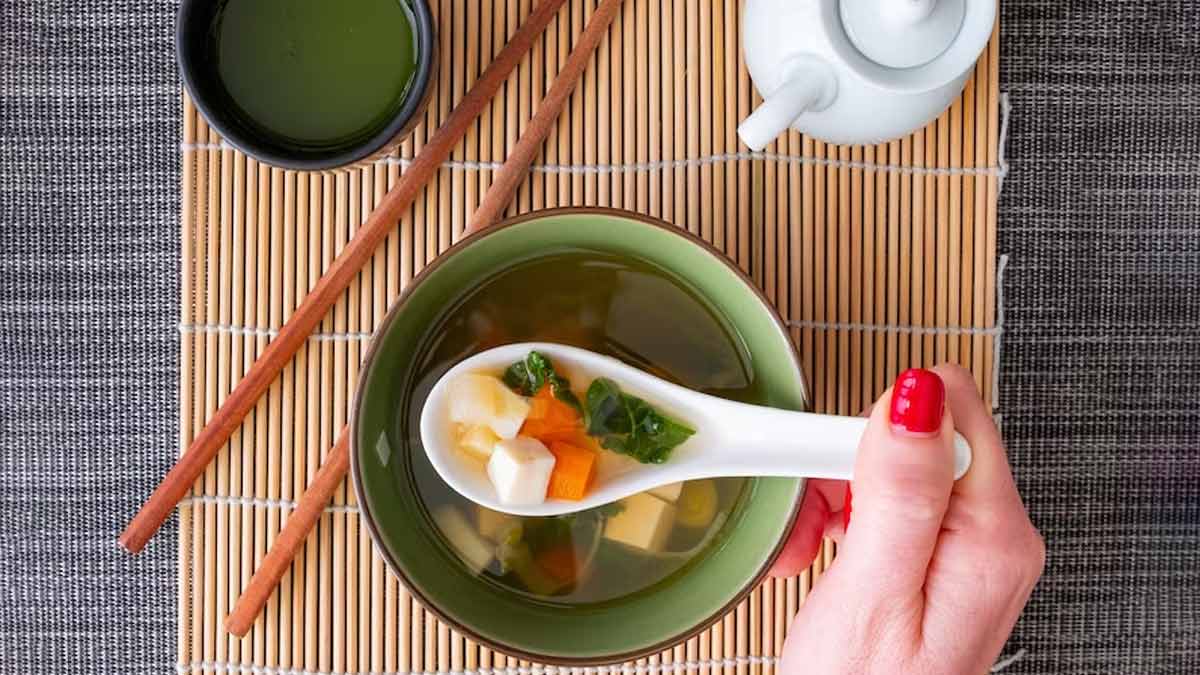
Without a doubt, monsoon is the time of year when we begin to crave warm and comforting foods that can provide a sense of nourishment. When it comes to satisfying those cravings, soup emerges as a top choice. One soup that perfectly fits the bill, especially during the monsoon season, is miso soup. This traditional Japanese dish offers not only a unique and savoury flavour but also a range of health benefits. In this article, we will delve into the nutritional value of miso soup and explore its various health benefits.
Table of Content:-
What Is Miso Soup?
Miso soup consists of flavorful broth and various ingredients such as tofu, seaweed, scallions, and mushrooms. The key component of miso soup is miso paste, which is made by fermenting soybeans with a culture called koji, along with salt and often grains like rice or barley. The fermentation process gives miso its distinct umami flavour and contributes to its numerous health-promoting properties.

Nutritional Value Of Miso Soup
Miso soup is a good source of protein, providing all the essential amino acids necessary for growth and repair in the body. The soup is also rich in minerals such as potassium, calcium, magnesium, and iron. It is rich in B vitamins, including niacin, riboflavin, and folate, which are important for maintaining overall health. Miso paste also contains beneficial bacteria called probiotics, which support gut health and aid digestion.
Also Read: 7 Probiotic Foods To Lead A Healthy Life
Health Benefits Of Miso Soup
1) Boosts Immune Function
Miso soup contains various nutrients and compounds that support a healthy immune system. The fermented soybeans in miso paste provide a range of antioxidants, vitamins, and minerals that help strengthen the immune response. By enjoying miso soup regularly, especially during the monsoon, you can give your immune system a natural boost.
2) Supports Digestive Health
The probiotics found in miso soup promote the growth of beneficial bacteria in the gut, improving digestion and nutrient absorption. These probiotics can aid in alleviating common digestive issues such as bloating, gas, and constipation. Miso soup also contains digestive enzymes that help break down food and support optimal digestion.

3) Provides Antioxidant Protection
Miso soup contains antioxidants that help protect the body against free radicals, unstable molecules that can cause cellular damage. Antioxidants help reduce oxidative stress and inflammation, which are linked to various chronic diseases. The fermentation process involved in making miso paste increases its antioxidant content.
4) Supports Heart Health
Miso soup offers potential benefits for heart health due to its soy content and probiotics. Soy isoflavones found in miso have been associated with a reduced risk of heart disease by improving cholesterol levels and blood vessel function. Probiotics in miso can also support heart health by positively influencing cholesterol metabolism. Incorporating miso soup into your diet during the monsoon can be a heart-healthy choice.
Also Read: Top 7 Healthy Cuisines Around The World
5) Sourcre Of Hydration
During the monsoon, it's important to stay hydrated. Miso soup can contribute to your hydration goals while providing nourishment. The warm broth of miso soup helps replenish fluids, and the various ingredients offer a blend of essential nutrients. The combination of water, electrolytes, and nutrients in miso soup can help restore energy, maintain hydration, and support overall well-being during the rainy season.
Image Credit: Freepik
Also watch this video
How we keep this article up to date:
We work with experts and keep a close eye on the latest in health and wellness. Whenever there is a new research or helpful information, we update our articles with accurate and useful advice.
Current Version